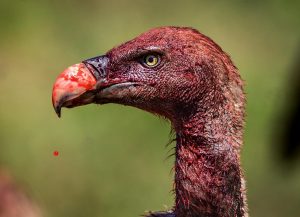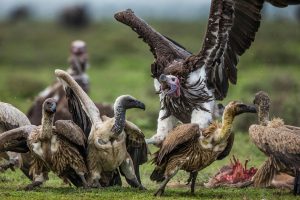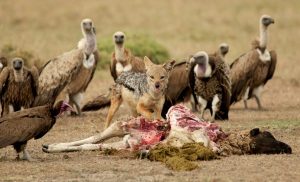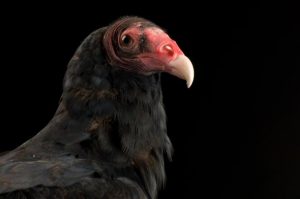
Rüppell’s Vulture by National Geographic
I think one of the things that we can all agree on is that heroes save lives. Whether you see Turkey Vultures as a hero or not, this is exactly what Turkey Vultures are. Like insects which feed on decaying matter, the vulture is unfortunately viewed as a pest. Vultures have experienced a rapid decline in populations around the world which is horrible since they are an essential part of the ecosystem and the prevention of diseases that would have otherwise infected wildlife, livestock, and humans.
Although populations of Turkey Vultures are stable since they are largely protected, Turkey Vultures and other vultures are a target for ranchers and other citizens who view them as creatures that spread disease and contaminate watering holes. Other things that threaten vultures include persecution, fishery bycatch, habitat loss, and decreasing food availability (Buechley and Sekercioglu 2016). They are also dying from lead poisoning after eating dead animals who have been shot with lead bullets (Ogada et al. 2012). People target vultures by poisoning animal corpses (Buechley and Sekercioglu 2016). Some of these poisons include but are not limited to pesticides, rodenticides, and insecticides which are also killing other wildlife like (Ogada et al. 2012; Buechley and Sekercioglu 2016). Another example is the veterinary drug diclofenac, which is given to cattle and causes kidney failure in vultures and this is made worse by the fact that Turkey Vultures are social eaters (Ogada et al. 2012; Buechley and Sekercioglu 2016). Meaning, when the contaminated corpse is found many turkey vultures will eat from it and become sick or die.
Vultures in general are the only obligate vertebrate scavengers (which means that they survive on scavenging carrion) and are one of the most rapidly declining bird groups (Buechley and Sekercioglu 2016). Out of 22 species of vultures, only 6 species are not threatened or endangered (Buechley and Sekercioglu 2016). Declining populations of vultures are a huge concern because they have specialized digestive systems that can efficiently eradicate diseases (Buechley and Sekercioglu 2016). Since Vultures have special stomachs that are highly acidic with a pH as low as 1, they are able to kill disease causing microorganisms that would cause illness or death in other animals ( Ogada et al. 2012; Buechley and Sekercioglu 2016).
As vulture populations decline, other animals that are facultative scavengers (meaning they can eat dead animals if it is there, but they can eat other things) are increasing in numbers and their digestive system is not made to handle and destroy viruses or disease. So these animals can contract and transmit diseases not only to other animals but to humans as well (Buechley and Sekercioglu 2016). These animals include insects, microorganisms, and terrestrial animals (Buechley and Sekercioglu 2016). Since vultures consume up to 90% of the carrion globally in some ecosystems, they help prevent the spread of many diseases including those that are deadly to humans (Buechley and Sekercioglu 2016).
Turkey vultures can locate a body within 12 hours, whereas it can take days for mammals to find a body allowing the carcasses to be available to be used as a breeding ground for viruses and disease (Buechley and Sekercioglu 2016). Turkey Vultures are essentially the Earth’s best clean-up crew because they save lives by removing decomposing bodies that can be a reservoir for diseases like Ebola, plague, anthrax, rabies, botulism, and cholera bacteria (Ogada et al. 2012; Buechley and Sekercioglu 2016).
In Africa the decline in vulture populations is ~98% in some species which has resulted in longer decomposition times of carcasses and an increase in the number of mammals eating carrion or interacting with the carcasses (Buechley and Sekercioglu 2016). Between 1992 and 2003, India has seen a decrease of ~99% in vulture populations and a 7 million feral dog increase even with sterilization programs being implemented (Buechley and Sekercioglu 2016). This resulted in 39 million dog bites during those years, which caused ~48,000 human deaths by rabies (Buechley and Sekercioglu 2016). This has caused India to spend an additional $1.5 billion dollars on healthcare annually (Ogada et al. 2012).
Video by BirdLife International
Landowners, government agencies, and the public need to work together to ensure that these heroes do not go extinct. We can reduce the decline in vulture populations by reducing poisoning incidents, making tougher laws for chemical and drug use, training dog teams to track down poison, and increasing communications between governements (Ogada et al. 2012).
As you can see, Vultures are essential part of our lives since their absence not only affects the environment and ecosystem but also human health and the economy. With the examples seen in India, Asia, and Africa we need to continue protecting our local vultures, which are the Turkey Vulture and Black Vulture in North America, so that we do not experience the ramifications of their absence.
To Learn more about our local Turkey Vulture, check out my other post, ‘The Graceful Turkey Vulture: Looks Fade but Brains Don’t’.
References



Hey Caitlynn! Excellent post! Since vultures don’t actually spread disease it makes me wonder how that myth came to be in the first place.. I can see that educational videos such as the one in your post can be used to inform the public on such an important topic. However, is this information expanding to people without the technology to watch such videos? Do you know if efforts have been made to reach developing countries and farmers who may not be in contact with mainstream media? It seems like these are the ones who prosecute vultures.
Thanks! Yes, I had to wonder the same thing, but humans as a species are not always the most logical. Some cultures even to this day use old wives tales and superstition in guiding their decisions.
It depends on which county we are talking about. Many countries have now banned the use of the veterinary drug diclofenac, which will have a positive impact on turkey vulture populations. In my readings for this post, in many African country little is being done to ensure their survival. In South Africa and Kenya, vulture conservation is largely run by local conservation organizations. In Asia, there is little to no support from the governments so conservation efforts have limiting success. In India, some groups are breeding vultures in captivity in hopes to reintroduce them into the wild to help increase the population loss. Some areas in India and Asia have made vulture safe zones where they supply supplemental food which is free of contamination for vultures. They have also done this near breeding areas to help increase the survival rate of the vultures offspring.
I hope that answers your question. I could not find anything specific to them talking to farmers but a lot of local conservation groups do work with locals to get there help with conservation.
I love the pictures in this post! Vultures are really cool creatures and I really appreciate your post because it really shows off their good side. It’s really disheartening to see how much vultures are declining around the world, especially considering their benefits to the ecosystem and wildlife and even human health. Is the increase in facultative mammalian scavengers mainly due to the decreased competition associated with the decline of vultures?
Thanks Hannah! From my readings, the decline in vultures resulted in the carcasses being left in areas longer, which allows other scavengers to find them. Since they have more food, their population has increased. So I guess it would be a result of decreased competition, although it would be an indirect competition. I have seen videos where the vultures move out of the way for facultative mammalian scavengers such as jackals. So I think they get first dibs if they are able to find the carcass before the vultures finish it off.